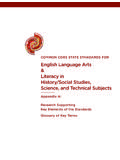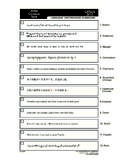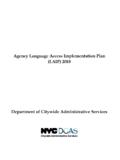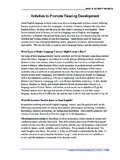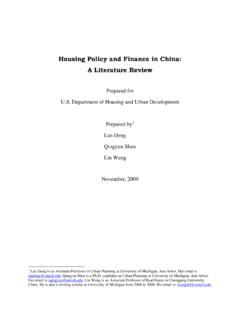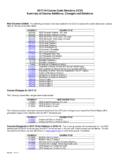Transcription of Urban Transport and Health - WHO
1 Division 44 Water, Energy, TransportUrban Transport and HealthModule 5gSustainable Transport : A Sourcebook for Policy-makers in Developing CitiesOverview Of THe sOUrcebOOksu stainable Transport :A sourcebook for Policy-Makers in Developing citieswhat is the sourcebook?This Sourcebook on Sustainable Urban Transport addresses the key areas of a sustainable trans-port policy framework for a developing city. The Sourcebook consists of more than 31 modules mentioned on the following pages. It is also com-plemented by a series of training documents and other material available from (and for Chinese users).who is it for?The Sourcebook is intended for policy-makers in developing cities, and their advisors.
2 This target audience is reflected in the content, which provides policy tools appropriate for application in a range of developing cities. The academic sector ( universities) has also benefited from this is it supposed to be used?The Sourcebook can be used in a number of ways. If printed, it should be kept in one location, and the different modules provided to officials involved in Urban Transport . The Sourcebook can be easily adapted to fit a formal short course training event, or can serve as a guide for developing a curriculum or other training program in the area of Urban Transport . GIZ has and is still further elaborating training packages for selected modules, all available since October 2004 from or are some of the key features?
3 The key features of the Sourcebook include: A practical orientation, focusing on best practices in planning and regulation and, where possible, successful experiences in developing cities. Contributors are leading experts in their fields. An attractive and easy-to-read, colour layout. Non-technical language (to the extent possible), with technical terms explained. Updates via the do i get a copy?Electronic versions (pdf ) of the modules are available at or Due to the updating of all modules print versions of the English language edition are no longer available. A print version of the first 20 modules in Chinese language is sold throughout China by Communication Press and a compilation of selected modules is being sold by McMillan, India, in South Asia.
4 Any questions regarding the use of the modules can be directed to or mments or feedback?We would welcome any of your comments or suggestions, on any aspect of the Sourcebook, by e-mail to and or by surface mail to:Manfred Breithaupt GIZ, Division 44 P. O. Box 5180 65726 Eschborn, Germanyfu rther modules and resourcesFurther modules are under preparation in the areas of Energy Efficiency for Urban Transport and Public Transport resources are being developed, and Urban Transport Photo CD-ROMs and DVD are available (some photos have been uploaded in photo section). You will also find relevant links, bibliographical references and more than 400 documents and presentations under , ( for Chinese users).
5 I(i) Sourcebook Overview and Cross-cutting Issues of Urban Transport (GTZ)in stitutional and policy orientation1a. The Role of Transport in Urban Development Policy (Enrique Pe alosa)1b. Urban Transport Institutions (Richard Meakin)1c. Private Sector Participation in Urban Transport Infrastructure Provision (Christopher Zegras, MIT)1d. Economic Instruments (Manfred Breithaupt, GTZ)1e. Raising Public Awareness about Sustainable Urban Transport (Karl Fjellstrom, Carlos F. Pardo, GTZ)1f. Financing Sustainable Urban Transport (Ko Sakamoto, TRL)1g. Urban Freight in Developing Cities (Bernhard O. Herzog)Land use planning and demand management2a.
6 Land Use Planning and Urban Transport (Rudolf Petersen, Wuppertal Institute)2b. Mobility Management (Todd Litman, VTPI)2c. Parking Management: A Contribution Towards Liveable Cities ( To m Ry e)Transit, walking and cycling3a. Mass Transit Options (Lloyd Wright, ITDP; Karl Fjellstrom, GTZ)3b. Bus Rapid Transit (Lloyd Wright, ITDP)3c. Bus Regulation & Planning (Richard Meakin)3d. Preserving and Expanding the Role of Non-motorised Transport (Walter Hook, ITDP)3e. Car-Free Development (Lloyd Wright, ITDP)ve hicles and fuels4a. Cleaner Fuels and Vehicle Technologies (Michael Walsh; Reinhard Kolke, Umweltbundesamt UBA)4b. Inspection & Maintenance and Roadworthiness (Reinhard Kolke, UBA)4c.
7 Two- and Three-Wheelers (Jitendra Shah, World Bank; Iyer, Bajaj Auto)4d. Natural Gas Vehicles ( M V V I n n oTe c)4e. Intelligent Transport Systems (Phil Sayeg, TR A; Phil Charles, University of Queensland)4f. EcoDriving (VTL; Manfred Breithaupt, Oliver Eberz, GTZ)environmental and Health impacts5a. Air Quality Management (Dietrich Schwela, World Health Organization)5b. Urban Road Safety (Jacqueline Lacroix, DVR; David Silcock, GRSP)5c. Noise and its Abatement (Civic Exchange Hong Kong; GTZ; UBA)5d. The CDM in the Transport Sector (J rg M. Gr tter)5e. Transport and Climate Change (Holger Dalk-mann; Charlotte Brannigan, C4S)5f. Adapting Urban Transport to Climate Change (Urda Eichhorst, Wuppertal Institute)5g.
8 Urban Transport and Health (Carlos Dora, Jamie Hosking, Pierpaolo Mudu, Elaine Ruth Fletcher)resources6. Resources for Policy-makers (GTZ)so cial and cross-cutting issues on Urban transport7a . Gender and Urban Transport : Smart and Affordable (Mika Kunieda; Aim e Gauthier)Modules and contributorsiiAbout the authorsDr Carlos Dora is an expert on Transport , Health impact assessment and Health in other sectors policies. He is coordinator of the World Health Organization's Interventions for Healthy Environments unit in the Department of Public Health and Environment, Geneva Headquar-ters, and has led work on a WHO Health in the Green Economy review of the Health co-benefits of climate change mitigation in five economic sectors, including Transport .
9 Previously at the WHO European Centre for Environment and Health , Dora was involved in developing a European Charter on Transport , Environment and Health and in establishing the ongoing Pan-European Process (the PEP) that provides technical support for harmonised Transport , Health and environment policies in the European region. Dora has an MSc and a PhD in epidemiology from the London School of Hygiene and Tropical Medicine. A medical doctor by training, he also practiced medicine and directed the organisation of Health services in Brazil and in the UK. He is the editor of the book Transport , Environment and Health (WHO, 2000), and author of a book on risk communication: Health hazards and public debate: lessons for risk communication from the BSE/CJD saga (WHO, 2006).
10 Email Jamie Hosking is a public Health medicine specialist affiliated with the School of Popula-tion Health , University of Auckland, Auckland, New Zealand. His particular interests include Transport , climate change and Health equity. His recent work includes a systematic review of Organizational travel plans for improving Health (Cochrane Collaboration, 2010) review-ing Health outcomes related to work and school-based travel change interventions and review of Health co-benefits of climate change mitigation policies in the Transport sector in the context of the WHO Health in the Green Economy series. He also has developed a framework for monitor-ing Health disparities in Transport systems at a district Pierpaolo Mudu is a geographer currently working at the WHO-Environment and Health Office in Europe.











